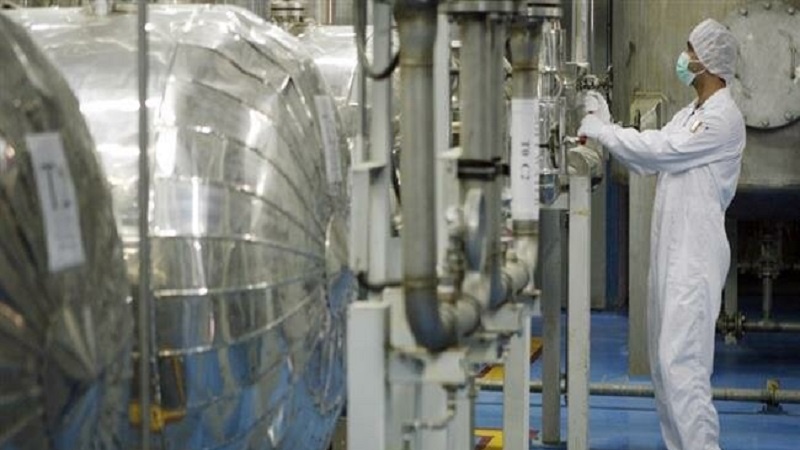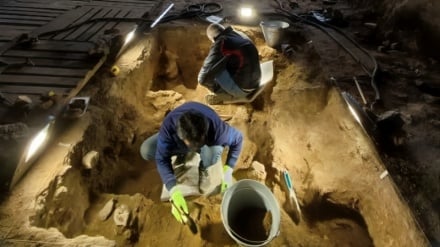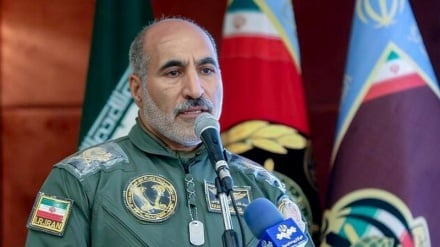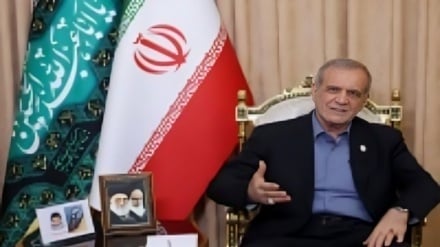Iran to cut nuclear deal commitments until it reaches ‘desired result’
Leader of the Islamic Revolution Ayatollah Seyyed Ali Khamenei described the US sanctions on Iran’s oil exports as a “short-term problem” facing the country, which could generate “long-term benefits”, by cutting reliance on oil revenues, if proper steps are taken to deal with the issue.
Ayatollah Khamenei also said the enemies, especially America, have failed to achieve their plots in regional countries despite spending huge sums of money there. The leader added US President Donald Trump himself admitted that the US has spent $7 trillion in the region, and received nothing but damage and defeat in return.
The following is an article in this regard by staff writers of Iran’s English language paper ‘Iran Daily’, under the heading: “Iran to cut nuclear deal commitments until it reaches ‘desired result.’”
Leader of the Islamic Revolution Ayatollah Seyyed Ali Khamenei said on Wednesday Oct. 02, 2019, Iran is determined to reduce more of its commitments under a 2015 multinational nuclear deal in response to the US exit from the accord until the country achieves the “desired result.”
Ayatollah Khamenei told senior commanders of Iran’s Islamic Revolution Guards Corps “We will continue the reduction of commitments and must continue with complete seriousness.” The Leader said the Atomic Energy Organization of Iran is in charge of those countermeasures and must fulfill its duty “completely and precisely,” in the manner required by the government.
Ayatollah Khamenei further said the US has so far failed and will “definitely” continue to fail in the “maximum pressure” campaign that it unleashed against the Iranian nation after abandoning the nuclear deal.
The Leader said: “The Americans, in fact, got themselves in trouble by pursuing such a policy”, adding, “Having failed to make Iran surrender, the Americans moved to arrange a meeting with President Hassan Rouhani, which they needed as “a symbol of Iranian submission” to pressure.”
Ayatollah Khamenei added the Americans even went as far as “begging and sought the mediation of their European friends,” but they failed to secure such a meeting and will continue to fail. The Leader described the US sanctions on Iran’s oil exports as a “short-term problem” facing the country, which could generate “long-term benefits”, by cutting reliance on oil revenues, if proper steps are taken to deal with the issue. Ayatollah Khamenei also said the enemies, especially America, have failed to achieve their plots in regional countries despite spending huge sums of money there.
He said “They created Daesh at hefty costs and provided it with weapons as well as financial and media support, and now that Daesh has been destroyed thanks to the diligence of youths in Syria, Iraq and Iran, they tell lies [by claiming] that ‘We destroyed Daesh.” The Leader added US President Donald Trump himself admitted that the US has spent $7 trillion in the region, and received nothing but damage and defeat in return.
President Hassan Rouhani said on Wednesday Oct. 02, 2019, a plan for talks presented to the United States and Iran by French President Emmanuel Macron is broadly acceptable to Iran. He said some wording needed to be changed in the plan, which would require Iran not to pursue nuclear weapons and to help the security of the region and its waterways, while Washington would remove all sanctions and allow Iran to immediately resume oil sales.
Speaking during a weekly cabinet meeting, Rouhani said, “We agree with the general framework by the Europeans.” France, Britain and Germany had urged Tehran to enter talks about a new arrangement on the nuclear deal.
Rouhani said that mixed messages about sanctions received from the United States while he was attending the United Nations General Assembly in New York recently had undermined the possibility of talks and discussing the plan.
He said it was unacceptable for Trump to say publicly that he would intensify sanctions while European powers told Iran in private that he was willing to negotiate.
Rouhani said “The American president on two occasions ... said explicitly that we want to intensify sanctions. I told these European friends, so which part should we accept? Should we accept your word that you say America is ready?”
“Or the words of the president of America who in 24 hours said explicitly twice ... that I want to intensify sanctions? [The Europeans] didn’t have a clear answer.”
President Rouhani said Iran has never been after nuclear weapons and whenever the rights of the Iranian nation are considered in plans and negotiations, “the road is not closed, and the road is again open.”
Iran’s president said European powers were continuing efforts to arrange talks. Germany, Britain and France were among signatories to Iran’s 2015 nuclear pact with the 5+1 group, which Trump quit last year.
Rouhani’s comments come amid heightened tension between Tehran and Washington following Trump’s decision over a year ago to unilaterally pull out of the nuclear deal with Iran. The US has imposed sanctions that have kept Iran from selling its oil abroad and have created economic difficulties for the country. Iran has since begun scaling down its commitments to the deal.
A French diplomatic source said on Tuesday Oct 01, 2019, that Trump phoned Rouhani on the sidelines of the UN summit but he refused to take the call. The source said the call happened on September 24 after Macron had shuttled between the US and Iranian leaders in a bid to arrange a historic encounter that he hoped would reduce the risk of all-out war in West Asia. The diplomatic source said “In New York, up to the last moment, Emmanuel Macron tried to broker contact, as his talks with president Trump and president Rouhani led him to think contact was possible.”
Speculation was abuzz last month that the presidents could meet on the sidelines of the General Assembly. But President Rouhani said he would only hold talks with the US if Trump lifted economic sanctions on Tehran. Macron used his 48 hours in New York to see Trump three times and Rouhani twice, urging them to engage directly. The source said Macron made a last-ditch attempt before flying back to Paris, with French technicians installing a secure phone line linking Trump’s Lotte Hotel and the Millennium Hotel, hosting the Iranian delegation.
The French official said “We set up the gear with the approval of the Iranians, evidently, because it was happening at their quarters,” adding, “The technicians arrived, the Iranians let them set up, they assisted them, there was no problem.”
The plan involved Trump calling at 9 p.m. local time despite doubts over the Iranian reaction.
Macron went to the Millennium to ensure the phone call took place. The source said Trump made the call, but Rouhani informed the French president he would not take it. Macron returned to Rouhani’s quarters later in the evening but the Iranian president was not willing to take part in the call.
The source said “The discussion continued to founder on the Iranians first wanting US sanctions lifted. Donald Trump wants Iran first to make commitments on its nuclear (activities) and ballistic and regional activities.”
French officials also said Trump and Rouhani agreed on a four-point document brokered by Macron in New York as a basis for a meeting and relaunching negotiations between the US and Iran. The document was the result of days of shuttle diplomacy by Macron.
According to the document, Tehran would agree that “Iran will never acquire a nuclear weapon” and will “fully comply with its nuclear obligations and commitments and will accept a negotiation on a long-term framework for its nuclear activities.” It would also “refrain from any aggression and will seek genuine peace and respect in the region through negotiations”, language that mirrors remarks made by Trump before the General Assembly on Sept 24, 2019.
According to the text, also as part of the plan, the United States would agree to “lift all the sanctions reimposed” and “Iran will have full ability to export its oil and freely use its revenues.”
Although Iran’s ballistic missile program is not specifically mentioned in the text, French officials claimed the language on Tehran’s regional role was understood by all sides to mean it would be part of negotiations. A French official familiar with the talks claimed “It was clear to all that the negotiation over regional issues would necessarily include their ballistic program.”
According to French officials, Trump agreed to the document in a meeting with Macron at the Lotte New York Palace Hotel. Macron then presented Rouhani with the same document at the Millennium Hilton New York One UN Plaza Hotel. The French official said “He agreed on the principles of the document and he thanked the president because there is the explicit mention of the sanctions [but] he wanted Trump to say before entering the meeting that he was lifting the sanctions.”
Foreign Minister Mohammad Javad Zarif told Iranian TV later Wednesday, Sept. 25, 2019, that Macron’s four-point plan for talks was “presented in his words and does not contain our viewpoints” but that work would continue.
Insisting that Iran is not pursuing nuclear weapons, Zarif said “It’s necessary that these negotiations continue until the issues are presented in a clear way. We will continue these contacts.”
Without elaboration, Zarif said Japan’s Prime Minister Abe Shinzo is applying efforts, too. Zarif said Iran has always wanted security in the Persian Gulf and if Saudi Arabia changes its regional policy, it will find “open arms” from Iran. He said “We have always said we are not after tensions with our neighbors.”
ME



